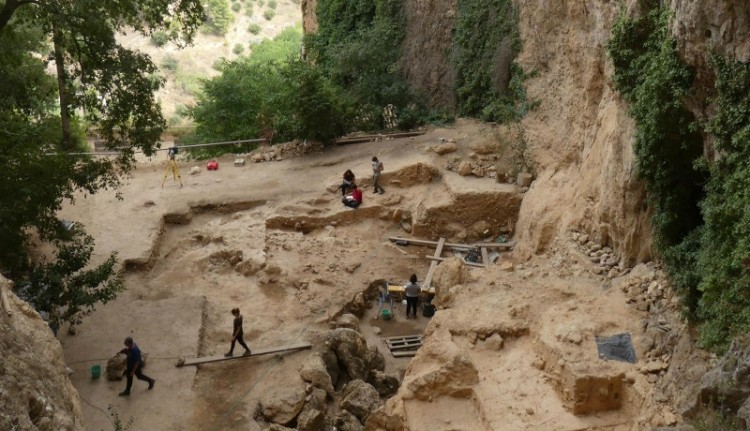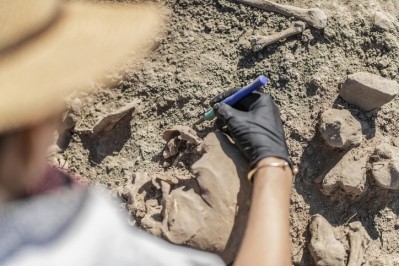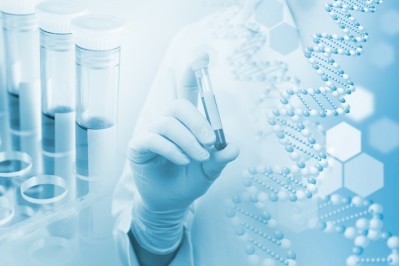Researchers dig up secrets of gut microbiomes from thousands of years ago

An international research team was able to analyze DNA from 50,000-year-old fecal sediments sampled at the archaeological site of El Salt, near Alicante, Spain, a location where Neanderthals lived before they disappeared from the scene. The fecal material—the oldest available to date—was excavated by an archeologist from the University of La Laguna, Campus de Guajara, Spain, and then sent to the University of Bologna for the analysis.
The study, published in the journal Communication Biology, suggests the ancestral components of human microbiota have been living in the human gastrointestinal tract for hundreds of thousands of years. Neanderthals have been shown through interbreeding to have contributed some DNA to modern humans and this recent research shows they may have contributed some microbiome components as well.
"Through the analysis of ancient DNA, we were able to isolate a core of microorganisms shared with modern Homo sapiens," explained Silvia Turroni, researcher at the University of Bologna and first author of the study. "This finding allows us to state that these ancient microorganisms populated the intestine of our species before the separation between Sapiens and Neanderthals, which occurred about 700,000 years ago."
Withstanding the test of time
DNA was extracted from 14 archeological samples and prepared for shotgun metagenomics in a dedicated aDNA facility at the Laboratories of Molecular Anthropology and Microbiome Research in Norman, Oklahoma. According to the report, “A total of 124,592,506 high-quality paired-end sequences were obtained by Illumina NextSeq sequencing and analyzed for bacterial aDNA.”
The researchers found that Neanderthals' gut microbiota already included some beneficial microorganisms that are also found in the modern intestine.
"These results allow us to understand which components of the human gut microbiota are essential for our health, as they are integral elements of our biology also from an evolutionary point of view," explained Marco Candela, the professor of the Department of Pharmacy and Biotechnology of the University of Bologna, who coordinated the study.
Speaking to NutraIngredients-USA, Professor Candela said that several components of the human gut microbiota are essential for our health: “According to our findings, Blautia, Dorea, Roseburia, Rumunicoccus, Subdoligranulum, Faecalibacterium and Bifidobacterium may all be a part of an hub of health-promoting gut microbiome components being evolutionary integral to the homo lineage and thus probably strategic for health.”
“Old friends”
Human evolution and lifestyle changes such as the consumption of processed food, antibiotic use, and sanitized environments have led to a critical reduction of biodiversity in the gut microbiota. The modern lifestyle has resulted in reduced intake of beneficial bacteria, suggesting that nonpathogenic bacteria are being eradicated. These lost beneficial microorganisms are known as "old friends.”
"The process of depletion of the gut microbiota in modern western urban populations could represent a significant wake-up call," said Simone Rampelli, a researcher at the University of Bologna and first author of the study. "This depletion process would become particularly alarming if it involved the loss of those microbiota components that are crucial to our physiology".
The uptick in chronic inflammatory diseases, such as inflammatory bowel disease, metabolic syndrome, and type 2 diabetes highlight how the loss of “old friends” is detrimental to our health.
“All these diseases are characterized by a diversity reduction,” said Candela.
Ancient microbiota for modern day solutions
"In the current modernization scenario, in which there is a progressive reduction of microbiota diversity, this information could guide integrated diet- and lifestyle-tailored strategies to safeguard the microorganisms that are fundamental to our health,” suggested Candela. "To this end, promoting lifestyles that are sustainable for our gut microbiota is of the utmost importance, as it will help maintain the configurations that are compatible with our biology.”
Therapeutic procedures, including the use of probiotics and prebiotics, have been proposed to lead to recovery of this missing microbiota, which Candela said is possible to reproduce.
“Next generation probiotics and bio-therapeutics, as multifunctional consortia, are the frontier of gut microbiome manipulation,” said Candela. “We need to preserve a well balanced diet that favors an eubiotic gut microbiome layout. For sure fibers, raw fibers, have a strategic role in this perspective. Another point is to reduce the load with xenobiotic compounds, which represent a threat for several gut microbiome components. For instance, a systematic analysis to dissect the impact of the different xenobiotic on the health-promoting gut microbiome components and hubs is needed. Lastly, we need to preserve a close interaction with the natural environment.”
A worldwide effort is needed
“I would like to encourage a worldwide collaboration between archeologist, paleontologists, geologists and molecular microbiologist, as I am convinced that the field of paleo-microbiomics can now open important perspectives for a better understanding of the microbiomes importance as a life support system on earth, providing strategic information to support and preserve a healthy planet,” said Candela.
Source: Communication Biology
4, 169 (2021) doi.org/10.1038/s42003-021-01689-y
“Components of a Neanderthal gut microbiome recovered from fecal sediments from El Salt”
Authors: S. Rampelli et al.















